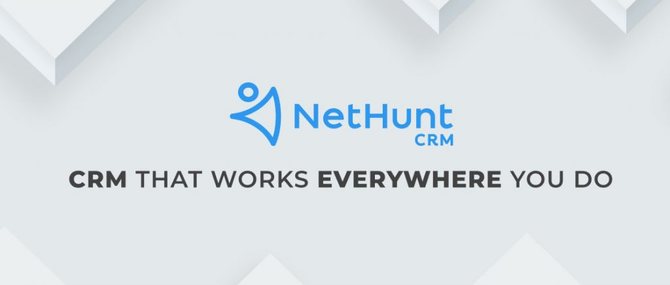Managing a sales team is challenging as it is - there are dozens of stages in the sales funnel that can go wrong at any given minute. Juggling prospects can, at times, turn chaotic. That’s why sales managers need a tool that would help keep all funnels under controls. Customer relationship management platforms are a successful way to streamline sales operations.
Companies are often reluctant when it comes to adopting aCRM system. If you are not sure about using customer relationship management for a sales department, this post will raise the curtain on its benefits and help you choose the software to tailor your needs.
Advantages of CRM
CRM software developers aim to help companies increase the pace with which leads move down the sales funnels. You will also be able to strengthen the relationship with the current customer base. Both SMEs and large-scale businesses will be able to benefit from all the advantages that using a customer relationship management system provides.
Higher efficiency of identifying prospects. By analyzing the interests and behavior of a company’s clientele, CRM will offer insights into which methods and platforms a business can use to reach out to users with matching characteristics.
Enhanced cross-selling strategies. A new framework helps business track their clients’ previous purchases and offer complementary products and services. A company will thus be able to bring forth revenue, all the while increasing the value provided to a customer.
Healthy internal communication environment. The system connects all the departments of a business and gives each employee access to customer-related data. As a result, all the company’s units have higher interdependence and are included in all kinds of decision-making. There will be fewer communication issues between teams.
Call centers are more efficient. Support agents will access order logs and call tabs. Thus, they will be able to build customer interactions based on the entire conversation history. previous ones. A customer will have a deeper connection with a call center operator who remembers the entire conversation history.
The team can access all the data on its leads, their purchase history, as well as the list of visitors’ interactions with the company. With a CRM, it takes a few clicks to see the status of all deals, when a follow-up is due, etc. That creates an interchangeable team and facilitates employee on-boarding.
10 Reasons to Use CRM for a Sales Team
Sometimes, using CRM software is a drag. It might seem that entering and sorting through data prevents teams from actual selling. However, the benefits of a customer relationship management system overweigh its drawbacks by huge numbers.
Here are the ten main reasons why your sales team needs to implement customer relationship management tools.
1. Safe storage space
A CRM system is a secure environment that’s designed specifically for storing sales data. Using spreadsheets and databases to organize the department’s activity might somehow work. Nevertheless, a customer relationship management system achieves structure and order in a much easier way.
A new sales department employee will have no issues during onboarding as all the essential data will be organized. Also, as they deal with sensitive data, customer relationship management system developers use innovative means to protect all files stored in a database.
With CRM, you will be compliant with all security regulations and well-protected from hacker attacks.
2. Reporting and analytics
With CRMs, you will no longer have to create manual reports. The system will summarize the activity of the department automatically and inform the management about the team’s progress. A report, generated by the software, is usually quite detailed, with graphics and charts. A team manager can choose the regularity of reports - weekly, monthly, etc.
3. Data segmentation
CRM systems enable data segmentation by various characteristics:
Demographics;
IndustryInterests;
Revenue;
Interactions with the content, and so on.
Thanks to data segmentation, sales managers successfully personalize their communication with leads. By getting exposed to the content he deeply resonates with, a prospect will move down the sales funnel faster.
4. Targeting/marketing
With its in-depth data analysis, customer relationship management helps sales and marketing managers identify lucrative targeting platforms. You will also get a better idea of the content that’s likely to hit the right spot in a customer’s mind and generate buying interest.
5. Helps to achieve goals
CRMs help companies prioritize leads, determine the right time to interact with a prospect, and reduce the overall time to close a deal by providing a full, 360-degree view of your next customer. The odds of getting sidetracked from the lead conversion will be lower.
6. Lead generation
As a technological powerhouse, a customer relationship management system has tremendous potential in lead generation optimization. Most solutions use artificial intelligence and big data to help sales teams analyze and predict the behavior of their prospects.
Here are the most prominent ways for CRM to improve lead generation:
Built-in integrations with social media that provide businesses with exposure opportunities;
Automating marketing activities;
Data-driven predictive customer analysis;
Through email marketing solutions.
7. Higher productivity
The CRM adoption allows business managers to adopt all process-heavy tasks, allowing the team members to focus on connecting with a lead. As a rule, humans are not efficient at performing monotonous work - the lack of concentration results in productivity pitfalls.
The relationship management tools free the team from tasks that are hated by many - data gathering, cold calling, or sorting through leads. Instead, an employee will be fully dedicated to work he enjoys - building human connections and closing deals.
8. Shorter sales cycle
CRMs can significantly cut down the length of a sales cycle in many ways:
Reducing the administrative workload.
Speeding up the decision-making process with built-in communication tools;
Providing sales managers with success rates for each prospect;
Automating customer communication and follow-ups.
If the system is used to its fullest extent, a sales manager will need fewer meetings to guide a lead to making a purchase. Your team will eventually end up with a higher level of customer engagement and faster corporate communication.
9. Increased revenue
CRM adoption directly impacts the company’s cash flow and helps bring forth new revenue streams. Here are a few ways the software assists businesses in earning more:
Higher conversion rates thanks to the increase of relevant customer data;
A sustainable customer relationship through regular follow-ups;
Leveraging add-on and cross-selling opportunities.
Using referrals to expand the customer base continuously.
10. Cost-effectiveness
Dedicated management platforms reduce the number of employees a sales team needs to reach high efficiency and sustainability. They improve risk evaluation and help companies bet on safe opportunities. Thanks to digitizing documentation, the team will no longer need to print multiple paper copies.
It’s safe to say customer relationship management can reduce the sales team’s operating costs both on a small (saving on paper) and large scale (fewer marketing expenses, no need for new hires).
How Do Sales Teams Use CRM
Customer relationship management is highly efficient if a sales team takes time to implement it correctly. Both SMEs and large-scale businesses use it to streamline lead generation, improve teamwork, and build a deeper connection with customers.
To understand what are the practical ways to benefit from CRM, let’s take a look at how the world’s biggest brands implement it.
Apple ensures its clients get more than one product a company has produced. While it comes with technological constraints (for instance, a user will not be able to play music using headphones other than Air Pods), the company managed to cultivate a strong sense of elitism among its clients.
KFC, for instance does an impressive job at cultivating and maintaining customer loyalty.. After downloading the company’s app, customers are encouraged to visit KFC more often, earn rewards for each order, and can later exchange them for free rewards.
Unilever uses software to monitor sales and improve the efficiency of its marketing activities. With the help of a dedicated system, the company managed to improve the performance of its call center, increase the customer inquiry response time, and tailor clients’ needs faster than other companies in the sector.
Choosing a CRM For Sales Reps
When sales teams understood the value of customer relationship management, developers started releasing CRM solutions on a daily basis. Today, there are hundreds of tools in the market. And most of them claim the leadership in the sector.
How to find the CRM tool that’s right for you?
Her are the tips that help find a solution that’ll fit your bill:
Identify business benchmarks and bottlenecks. Assess the sales department’s performance and detect team performance issues. Then, write down the objectives that you’d like to achieve for the next year, five years, and so on.
Make sure the product is easy to use. Be it a full-motion tech powerhouse, if the tool feels cluttered, takes a ton of time to navigate, and has a steep learning curve, steer clear from it. You want to find a solution that can be mastered back to back during a 2-week employee orientation session.
Opt for the cloud. With a cloud-based tool, the team will have access to sales data anytime, without being tied to one device. Choosing the cloud means faster communication, more flexibility, and fewer constraints (storage space and such).
Make sure the system has integrations with all the solutions you use for day-to-day sales management (e.g. Mailchimp or Facebook).
Features of CRM for Sales Team
Customer relationship management is a pillar for a striving sales strategy. However, not all software tools are equally great for businesses - while some might have a full suite of features, others are relatively basic.
The cost and scale of solutions vary as well. When finding the golden mean between pricing, features, and the interface, it’s essential to define which tools are crucial to your businesses.
To help you choose between dozens of alternatives, here are the basic features developers include in customer relationship management systems:
Automating the sales process tasks - outreach emails, calls, scheduling appointments, etc.
Advanced reporting - capturing metrics across all facets of the funnel to understand if the team’s efforts and investments match its expected performance;
Optimizing workflows - data gathering and analysis automation;
Mobile access - access to clients’ data and get real-time alerts about the status of marketing campaigns from a tablet or a smartphone;
Email client integration - a tool that allows users to optimize their marketing activities without giving up a chosen email client - Outlook, Gmail, and others;
Team performance management - the system provides sales managers with individual performance statistics along with insights on improving personal efficiency;
File synchronization - all users of the platform can access data a team member has uploaded;
Bulk email campaigns. CRMs help sales teams save time when sending out drips or newsletters as you’ll be able to send hundreds of emails in one click. Other than that, a customer relationship management system should provide companies with tools for data aggregation automation.
An inventory database - the software provides tracking mechanisms to see how the popularity of a company’s products fluctuates.
When a company is looking into software options, they are usually in need of ways to track interactions, manage pipelines, and reach out to leads more efficiently. For that, a data-driven, automated environment is crucial.
How to Motivate Your Team to Use CRM Software for Sales?
As a sales manager, you have to embrace the resistance your team is likely to have when it comes to CRM adoption.
The lack of enthusiasm is natural any time when the new technology is in the picture. It has been like that at the end of the last century, when computers were adopted for work, or once before that, in the era of the Industrial Revolution.
Having said that, there are ways to motivate a sales team to adopt customer relationship management practices, namely:
Train your employees. Schedule a two-week orientation session and show the team all the features the CRM has and the way it helps to simplify the daily work while using at maximum. Communicate the benefits clearly. Emphasize on the fact of decluttering the team’s day and switching from manual tasks to a more engaging job. They need to get a clear understanding of why you, as a manager, decided to change the framework.
Create guides for using CRM. It might be complicated to remember the UI of the system from the first time, so it would be helpful to create s step-by-step guide or include the tutorials that the company provides.
Lead by example. Be the first one to use the CRM system - the team will follow. If a manager works more efficiently, productively, and with ease, eventually, fellow sales managers will get on board.
Most importantly, keep an open mind throughout the adoption process. Be empathetic when someone on the team speaks up about the struggles with customer relationship management tools and look for ways to find a middle ground without giving up your vision.
Start Using a CRM for Sales People
Since 5-7 years ago, CRM software became a serious contender, and, ultimately, the sales team’s first choice compared to task managers and spreadsheet tools. Customer relationship management practices fall in line with all the emerging sales and marketing trends - personalization, automation, and data-driven marketing.
To fully understand all the benefits CRM software brings to the table, the sales team needs to adopt one. Don’t hesitate to find a tool that meets your demand and give it a try. In the span of a few weeks or a month, you will already see the fruits of the decision - and you will not regret taking it.
NetHunt CRM Solution For Sales Team

Do you want to have a solution that takes no time to master and helps the sales teams make the most out of the tools they are already using? Then, give NetHunt CRM a try. It’s a platform that is integrated with Gmail and G Suite - there’s no need to change the way you manage sales.
NetHunt CRM provides sales, marketing, and customer support departments with a wide range of opportunities.
If you are a sales manager, use NetHunt CRM to:
Store and classify leads and
Create customer profiles using emails;
Send messages and follow-ups automatically;
See the customer’s order history and other relevant details in every email;
Generate insightful reports that use data visualization tools.
Clarify and remove gaps from your sales strategy
If you’re a marketing manager, NetHunt CRM will help:
Personalize and automate email marketing activities;
Ensure your company’s emails don’t end up in ‘Promotions’ and ‘Spam’ folders;
Get real-time performance and efficiency reports.
If you’re a support manager, NetHunt makes it easy to:
Automatically create and assign support tickets;
Answer client inquiries instantly for better satisfaction rates;
Prioritize requests by selected metrics.
NetHunt has been featured by more than a handful of trusted media - Venture Beat, The Next Web, Engadget, and many more. It’s a trusted solution, tried by SMEs in all sectors. The platform covers all facets of lead management and synchronizes the work of all departments - marketing, sales, human relations, and customer support.
NetHunt Features and CRM Benefits For Sales Reps
NetHunt is a powerful lead management platform as it combines a minimalistic, easy-to-use design, with the power of integrations, data analytics, and reporting tools. Here’s a glimpse at the CRM’s features:
Fully blended inside a Gmail’s UI - more than just an integration;
A customer profile with all relevant data that pops up next to the conversation with that client;
Valuable sales insights on a daily, weekly, and monthly basis;
Bulk email sending;
A fully customizable interface;
A centralized platform for the entire team, with personalized privacy and access settings;
Natively integrated into G Suite.
Conclusion
Customer relationship management is a powerful conversion boost if done right. By finding new ways of reaching out to leads, guiding them down the sales funnel, and closing deals, sales teams accomplish higher conversions, operating costs reduction, and a more enjoyable working experience.
Depending on the scale of the business, sales teams might prioritize different features in their next tool. Integrations, mobile access, automation, and reporting features are the most important in modern-day customer relationship management software.
To ensure the transition to a dedicated platform is seamless, make sure to settle for tools that integrate well with the team’s current sales management instruments. To that end, NetHunt, a CRM that’s fully integrated into G Suite, is the soundest choice to make.








